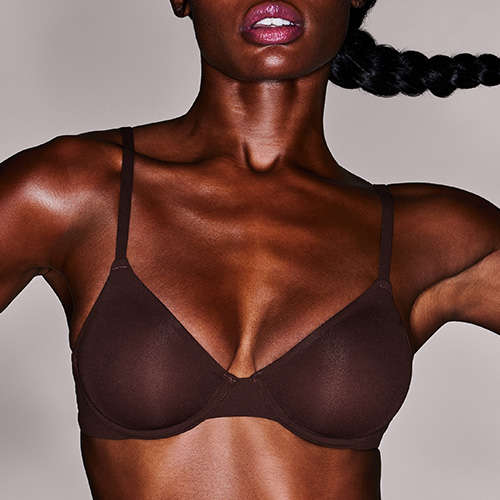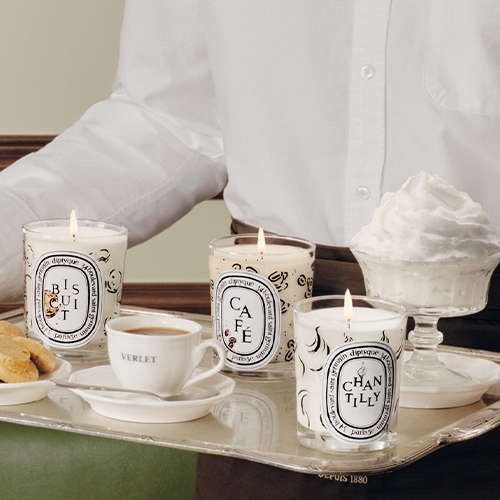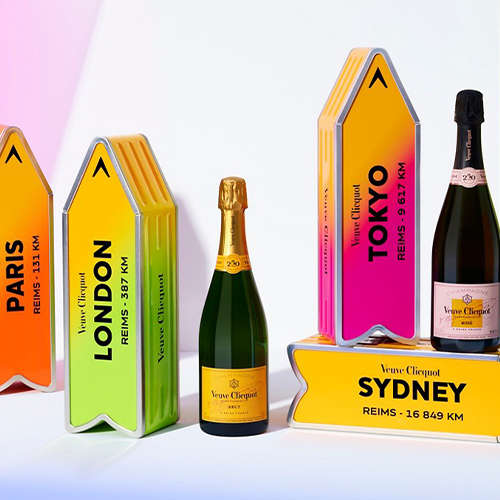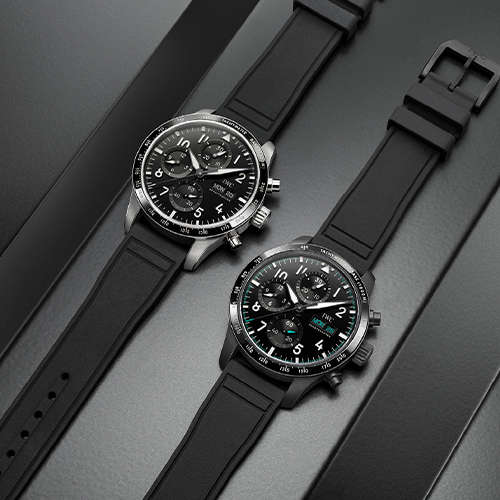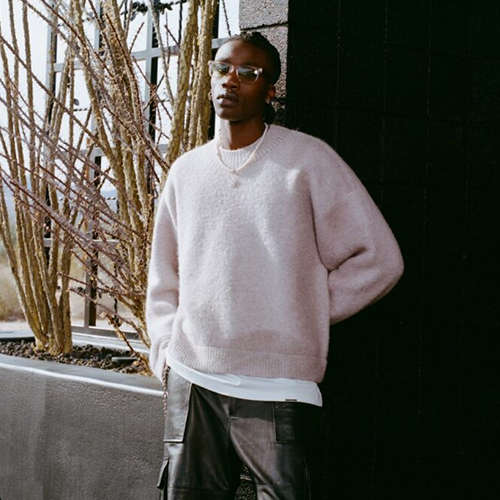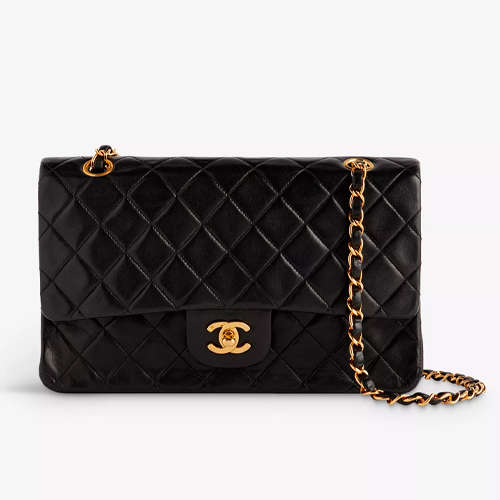- Australia / AUD $
- Canada / CAD $
- China / CNY ¥
- France / EUR €
- Germany / EUR €
- Hong Kong SAR China / HKD $
- Ireland / EUR €
- Italy / EUR €
- Japan / YEN ¥
- Kuwait / USD $
- Macao SAR China / HKD $
- Netherlands / EUR €
- Qatar / USD $
- Saudi Arabia / USD $
- Singapore / SGD $
- South Korea / KRW ₩
- Spain / EUR €
- Taiwan / TWD $
- United Arab Emirates / USD $
- United Kingdom / GBP £
- United States / USD $
- Not yours? Read more
Tell us what you think
Shop in your local currency and language
You are currently in United Kingdom GB / GBP £ store
- English
- English
- English
- English
- English
- English
- English
- English
- English
- English
- English
- English
- English
- English
- English
- English
- English
- English
- English
- English
- English
Did you know that we deliver to 130 countries or regions and offer a range of delivery options to suit you wherever you are in the world? Find out more
Sign up once to our Selfridges+ service and you can enjoy unlimited deliveries wherever you are in the world. FIND OUT MORE
International delivery
With almost everything on selfridges.com available for International Delivery, you can send your order to 130 countries or regions around the world, including North America, Australia, the Middle East and China.
Although we only offer 20 currencies to browse in online, you can still deliver to all of the following countries or regions:
- Algeria
- Andorra
- Antigua and Barbuda
- Aruba
- Australia
- Austria
- Azerbaijan
- Bahrain
- Bangladesh
- Barbados
- Belarus
- Belgium
- Belize
- Bermuda
- Bolivia
- Botswana
- Brunei
- Bulgaria
- Cambodia
- Canada
- Cayman Islands
- Chile
- China
- Colombia
- Costa Rica
- Croatia
- Cyprus
- Czech Republic
- Denmark
- Dominica
- Dominican Republic
- Ecuador
- Egypt
- El Salvador
- Estonia
- Finland
- France
- French Guiana
- Germany
- Gibraltar
- Greece
- Grenada
- Guadeloupe
- Guatemala
- Guernsey
- Guyana
- Honduras
- Hong Kong
- Hungary
- Iceland
- India
- Indonesia
- Ireland
- Israel
- Italy
- Jamaica
- Japan
- Jersey
- Jordan
- Kazakhstan
- Kenya
- Kuwait
- Laos
- Latvia
- Lebanon
- Lesotho
- Liechtenstein
- Lithuania
- Luxembourg
- Macau
- Malaysia
- Maldives
- Malta
- Martinique
- Mayotte
- Mexico
- Monaco
- Montserrat
- Morocco
- Myanmar
- Namibia
- Netherlands
- New Zealand
- Nicaragua
- Nigeria
- Norway
- Oman
- Pakistan
- Panama
- Paraguay
- Peru
- Philippines
- Poland
- Portugal
- Puerto Rico
- Qatar
- Reunion
- Romania
- Rwanda
- Saint Kitts and Nevis
- Saint Lucia
- Saint Martin (French part)
- San Marino
- Saudi Arabia
- Serbia
- Singapore
- Slovakia
- Slovenia
- South Africa
- South Korea
- Spain
- Sri Lanka
- Suriname
- Swaziland
- Sweden
- Switzerland
- Taiwan
- Tanzania
- Thailand
- Trinidad and Tobago
- Turkey
- Uganda
- Ukraine
- United Arab Emirates
- United Kingdom
- United States
- Uruguay
- Venezuela
- Vietnam
The perfect cup of coffee
Words: Amy Newson
Ah, coffee. We can’t start the day without it, which is why we were buzzing to explore the complex world of our morning (and let’s face it, sometimes afternoon) pick-me-up. From growing, sourcing and roasting the magical coffee bean, to the many different ways of brewing it, our panel of coffee experts – Richard Blake at Yallah Coffee, Fabio Ferreira at Notes Coffee Roasters (who curated our brand-new Selfridges Selection coffee range) and more – are here to teach us the art of a truly perfect cup of coffee and shine a light on earth-conscious processes as they go.
Meet the panel
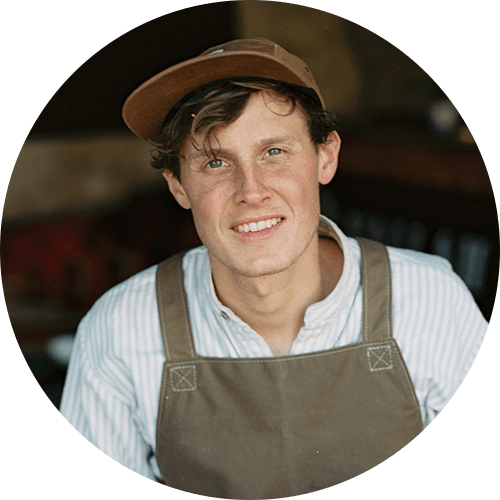
RICHARD BLAKE
Founder and Director of Yallah Coffee

GENEVIEVE KAPPLER
Roast Master at Roasting Plant Coffee
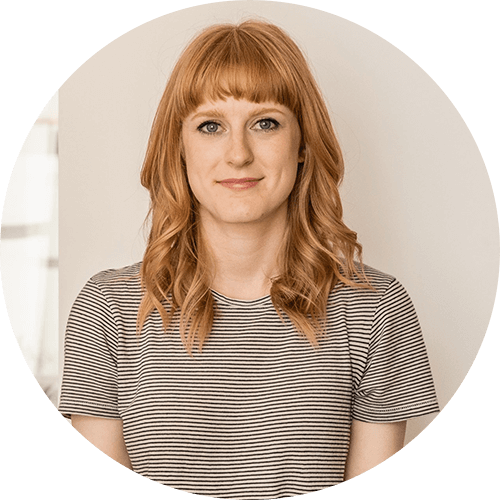
CLAIRE WALLACE
Coffee Roaster at Assembly

FABIO FERREIRA
Co-founder of Notes Coffee Roasters
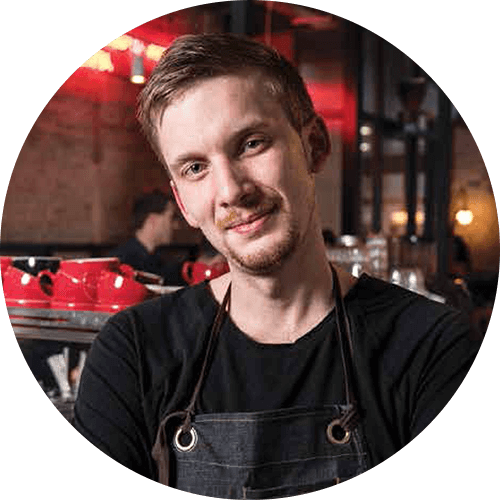
SAM TREVETHYEN
Head of Coffee at Grind

We discussed sourcing coffee beans with Richard Blake, Founder and Director of Yallah Coffee
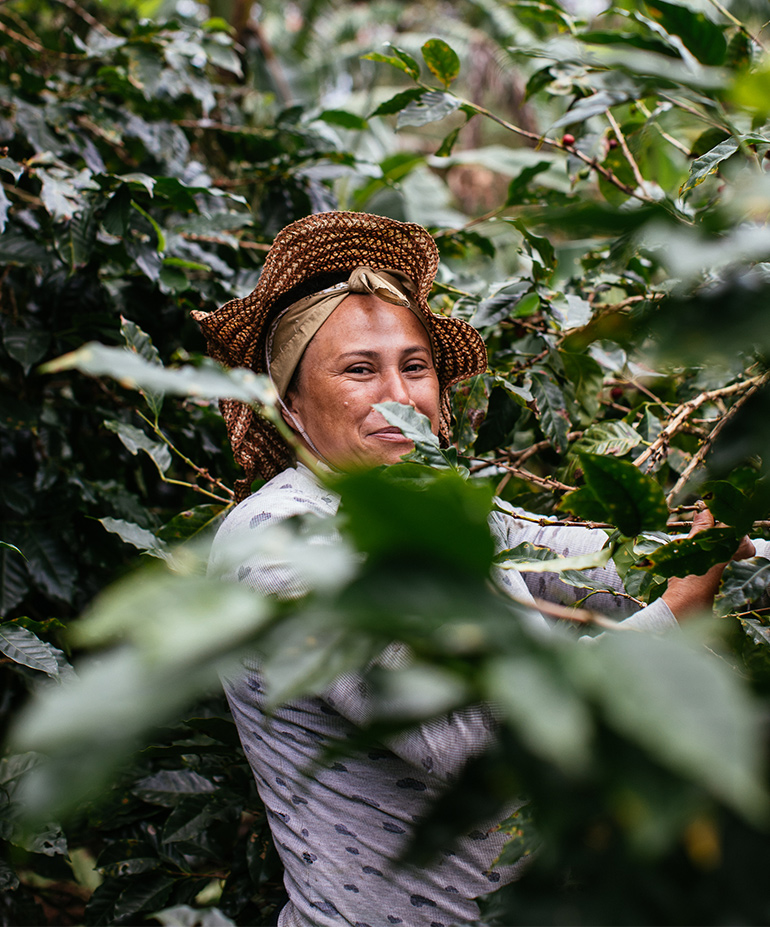
Coffee farmer picking coffee fruit
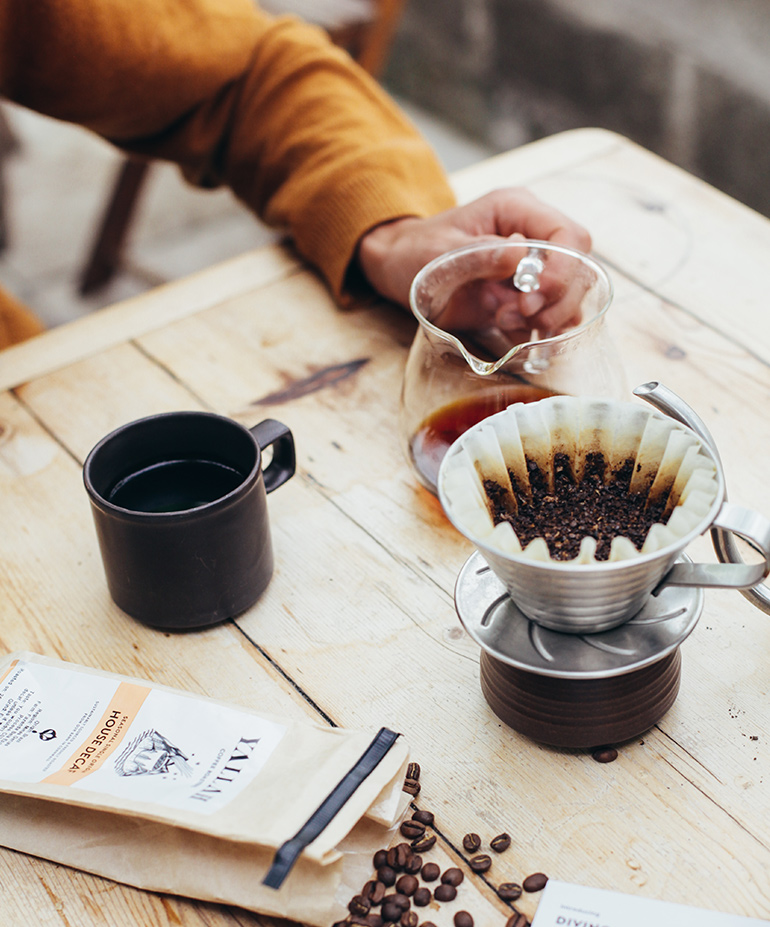
The final product (delicious)
How do you go about sourcing your coffee beans?
While taste is the first thing we think about when we’re sourcing new coffees, the most important things are transparency, fairness and farming practice. We place a high value on how the coffee is grown, protection of the natural environment and working with growers who are doing what they can to reduce their impact on the planet.
How does the flavour of the bean vary from continent to continent?
Coffees from Africa tend to be high acidity, complex and often fruity, while coffees from South America tend to be nutty with lots of chocolate notes. I love finding coffees from regions that break these trends – Colombia is a great example of this; you can find almost every profile in Colombian coffee.
Tell us about the farmers who grow your coffee beans.
Over 60% of the coffee we buy is from a small group in Brazil called The Associate Group of Producers of Divinolandia. They’re basically a group of farmers who are working together to get recognised as a region that produces outstanding coffees. You can really feel that when you taste the coffee and meet the people – these guys are hand-picking coffee on a small scale, with help from friends and family when it comes to harvest time.
Yallah Coffee is available in the Foodhall at Selfridges London.

We talked coffee roasting with Genevieve Kappler, Roast Master at Roasting Plant Coffee
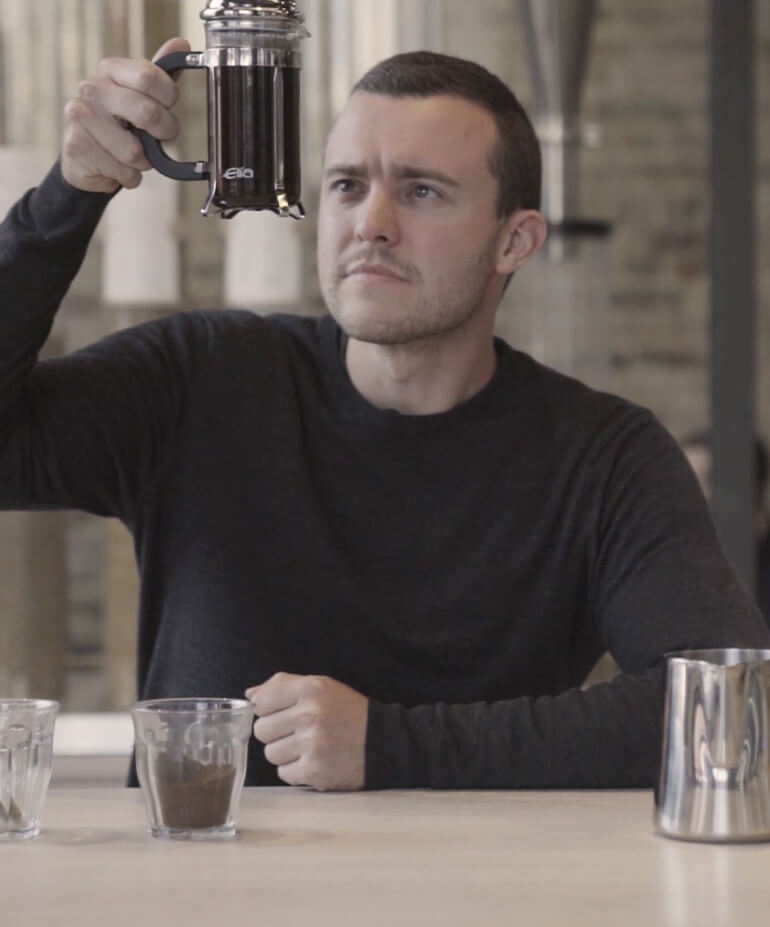
Brewing to perfection
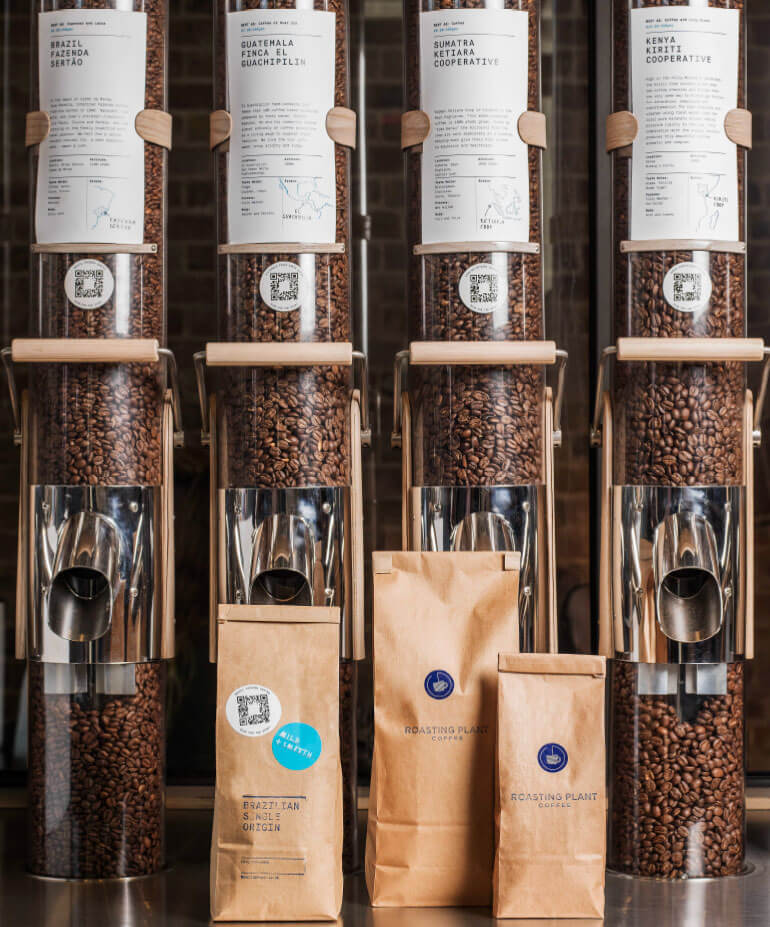
Find your favourite bean in the Foodhall at Selfridges London
How does freshly roasting coffee affect the final taste?
Freshly roasted coffee is incredibly smooth and full flavoured, displaying all the wonderful and unique characteristics of each bean. After seven to ten days, coffee loses up to 70% of its flavour and aroma, and quickly develops a bitter aftertaste regardless of how it’s stored. That’s why we recommend using your coffee within two weeks of roasting.
Tell us about your roasts.
We roast every bean to perfection, never over-roasting to black and oily. Coffee aficionados can find the bean they love, brew it into their favourite cup and add whatever they like for the most flavourful and smooth cup.
What’s Roasting Plant Coffee up to at Selfridges?
Roasting Plant Coffee has launched in the Foodhall at Selfridges London. We’ll be serving up micro-batch brewed coffee every day, using Roasting Plant’s proprietary technology innovation known as Javabot™. We’ll also be helping you find your favourite bean (choose from seven single-origin beans and blends – or blend your own), with the help of our AromaFlow™ technology with which you can smell every freshly roasted single-origin bean on demand.

We found out about brewing processes from Claire Wallace, Coffee Roaster at Assembly Coffee
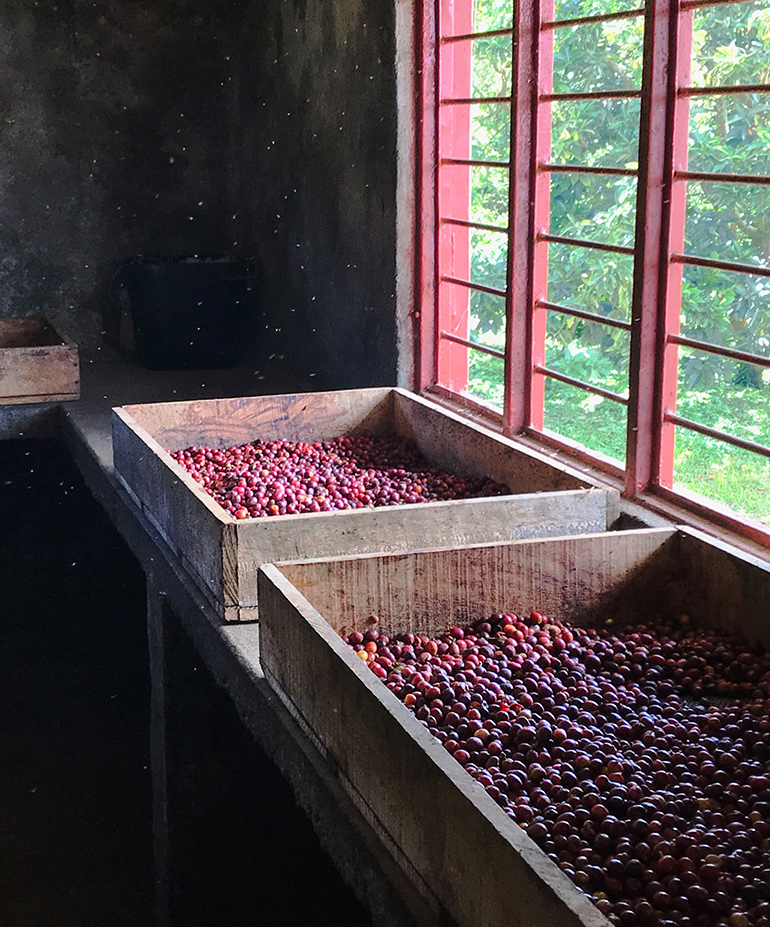
Coffee fruit drying
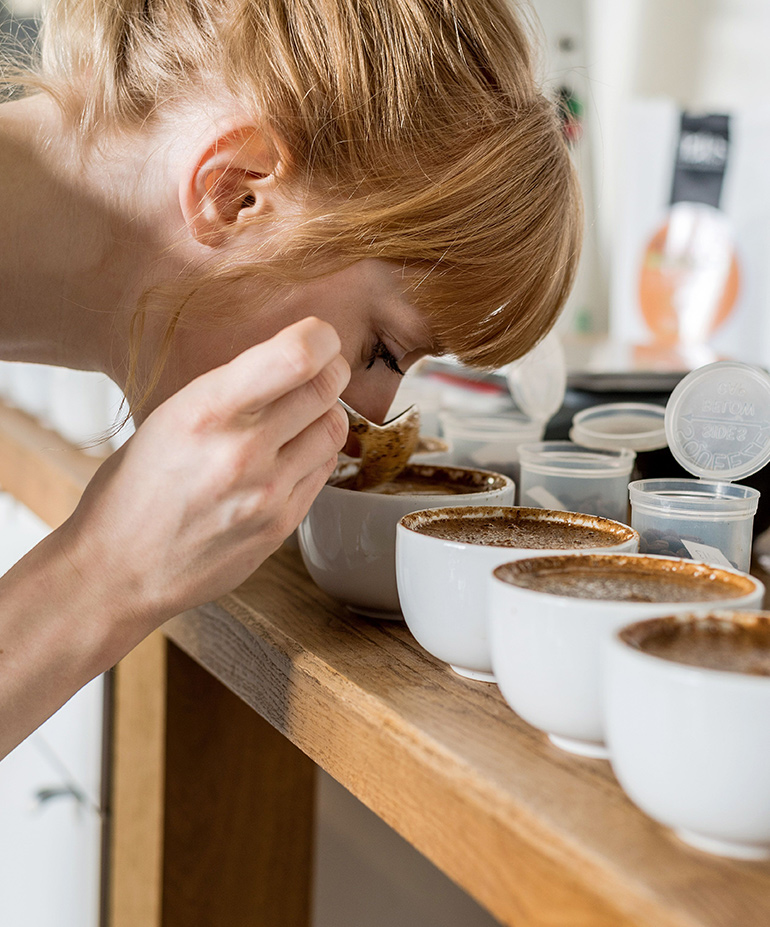
Claire doing what she does best – coffee cupping (that's tasting, to you and me)
What’s your favourite way to make coffee?
At home, I really enjoy making hand-poured filter coffee – the process helps me wake up in the morning.
Tell us about the different ways there are to brew coffee, and how each affects the final flavour.
The two most popular methods are espresso and filter. To make an espresso, hot water at high pressure is pushed through a cake of ground coffee, resulting in a very short beverage with a high flavour concentration. Filter coffee takes longer to brew and can be done in two ways. Full immersion (using a cafetière), where ground coffee is immersed in water and brewed for an appropriate amount of time, produces a coffee with a rich, full body. Pour-over methods (using a V60, for example) involve the brewer gradually pouring water over a bed of ground coffee – this is great to highlight the flavour complexity and brightness in a coffee and tends to be lighter in body.
What is the most popular order you receive from customers?
Easily a flat white, which I think is a very popular order in most cafés. It gets the balance of the richness of the milk and the espresso flavour just right.
Assembly Coffee is available in the Foodhall at Selfridges London.

Claire’s perfect pour
YOU WILL NEED:
23g (or close as possible) medium ground coffee
1 V60 filter (or another conical brewer)
1 V60 filter paper
Boiling water (filtered is ideal)
Digital scales
THE HOW-TO:
1. Thoroughly rinse the filter paper by placing it in the V60 and pouring boiling water through.
2. Discard the spent water and set up your V60 on your mug, on top of your scales.
3. Load your freshly ground coffee into the V60 and distribute evenly so that the bed of coffee is flat.
4. Set a stopwatch running and pour 70ml of water, then wait 40 seconds.
5. Pour the remaining 290ml at a steady but slow pace – the scales should read 360ml.
6. Leave to drain completely.
7. Sip, and enjoy.
Did you know
The flavour outcome of coffee is heavily dependent on the climate, soil and elevation in which it is grown. Even within the same country, coffee grown in different valleys will deliver diverse notes.

We chatted about sustainability and our Selfridges Selection coffee range with Fabio Ferreira, Co-founder of Notes Coffee Roasters
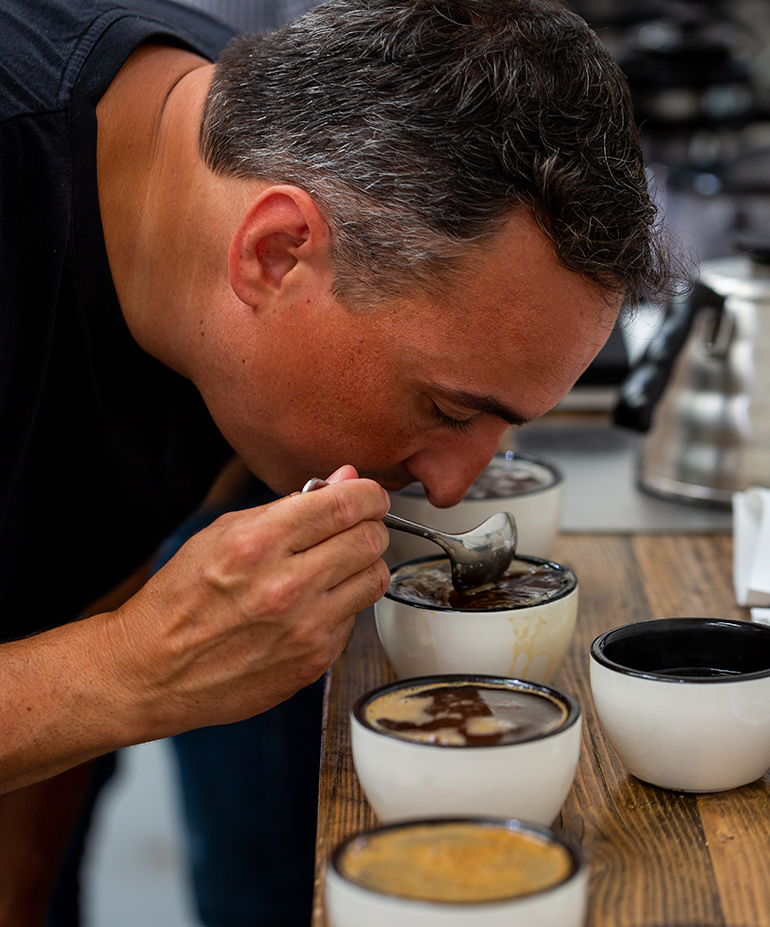
Fabio doing what he does best – coffee cupping (that's tasting, to you and me)
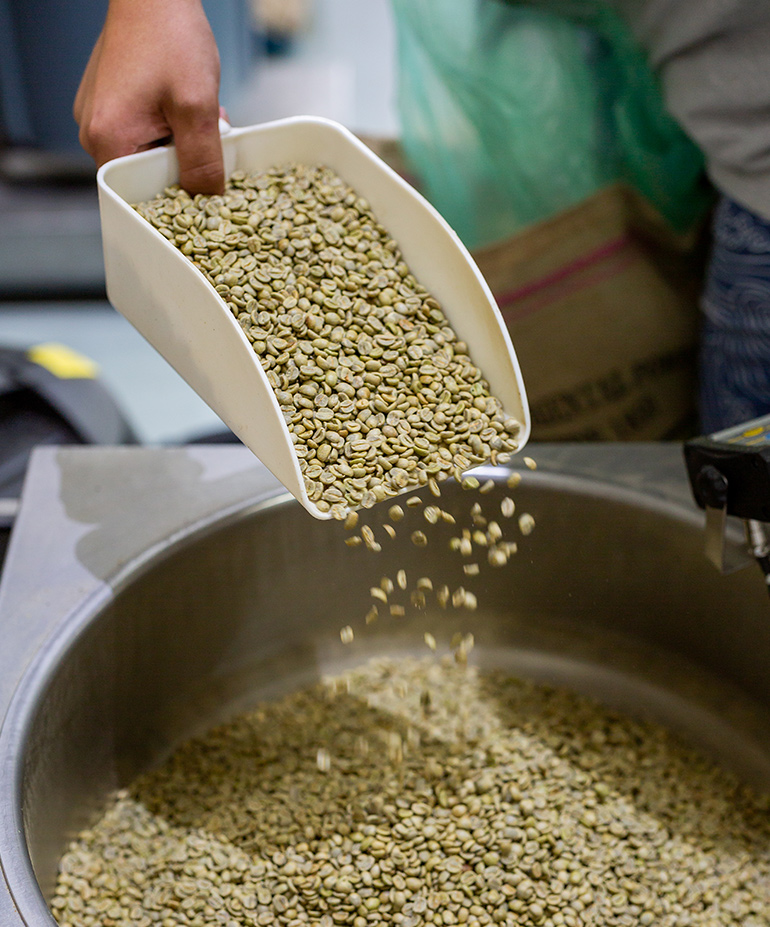
Unroasted coffee beans
Why is it important to source coffee sustainably?
Speciality coffee farms employ organic practices to produce natural pesticides and fertilisers. The work required is much harder throughout the year, and the costs of maintaining the plantation are much higher, but the results in the cup and for the planet make it all worth it.
Why did you choose to team up with Selfridges to create our range of Selfridges Selection coffees?
We are so excited to be partnering up to create these delicious single-origin speciality coffees. To be part of the Selfridges Selection range is a great opportunity to spread the speciality coffee story to a wider audience.
Tell us about the range: where are the beans from, and how are they roasted?
We’ve curated a range of delicious coffees from around the world for Selfridges, from the biggest coffee-growing country, Brazil, to one of the most famous producers, Colombia. We have also travelled as far as South-east Asia, to Myanmar, which is a new arrival on the speciality coffee scene, as not many people have seen or tasted their exotic coffees yet. Our chosen crops are not only amazing quality and grown using sustainable practices but are also all from female-owned farms.
Cooperatives and exporters tend to pay less for coffee produced by women, so we make sure we pay each of our producers properly for their hard work.
– Fabio Ferreira, Co-founder of Notes Coffee Roasters

We explored coffee culture with Sam Trevethyen, Head of Coffee at Grind
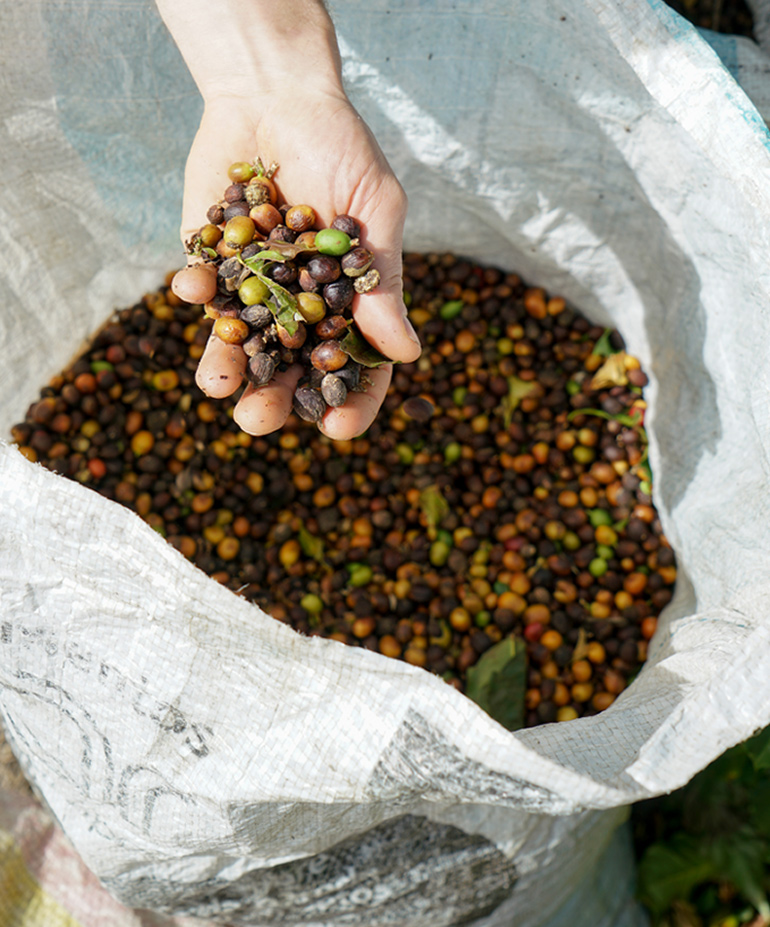
Picked coffee fruit
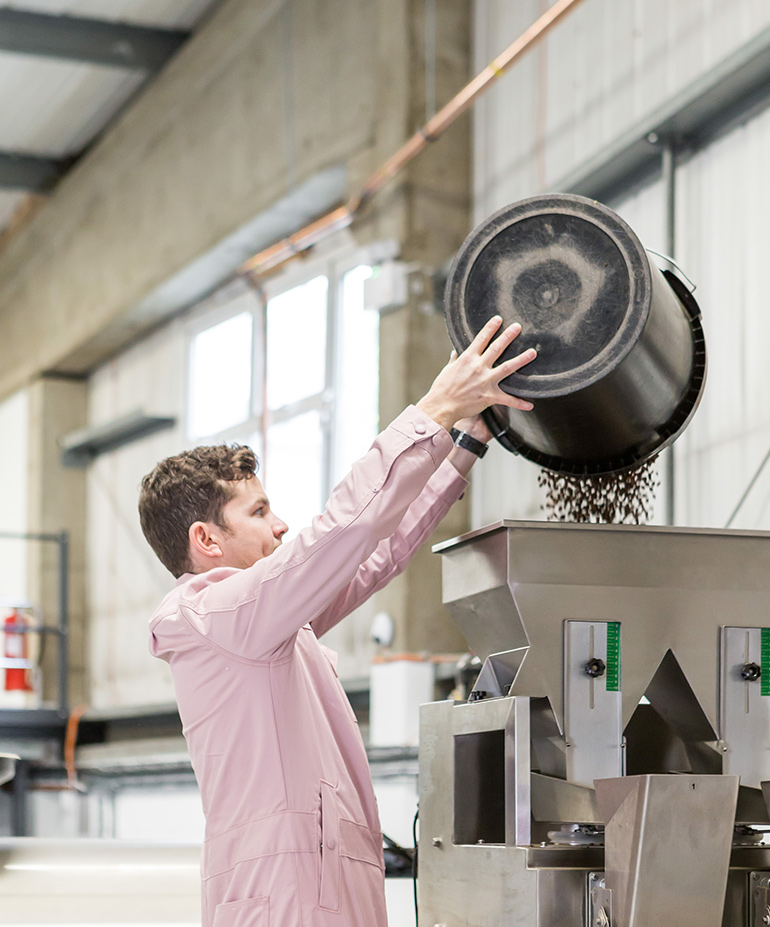
Getting the perfect grind
Why is coffee culture such a key part of London life?
Cafés provide a place for us to escape the office, meet up with friends, hold meetings or generally socialise. In the fast-paced environment that is London, they provide a much-needed “third space” – that place that’s not home or work.
How does Grind provide coffee culture to people at home?
We’ve seen incredible growth online over the past year, with so many people wanting to bring Grind coffee home. While we’re really grateful to have people visit our London locations, we’re still sending out more and more coffee and compostable coffee pods every day to our friends and subscribers.
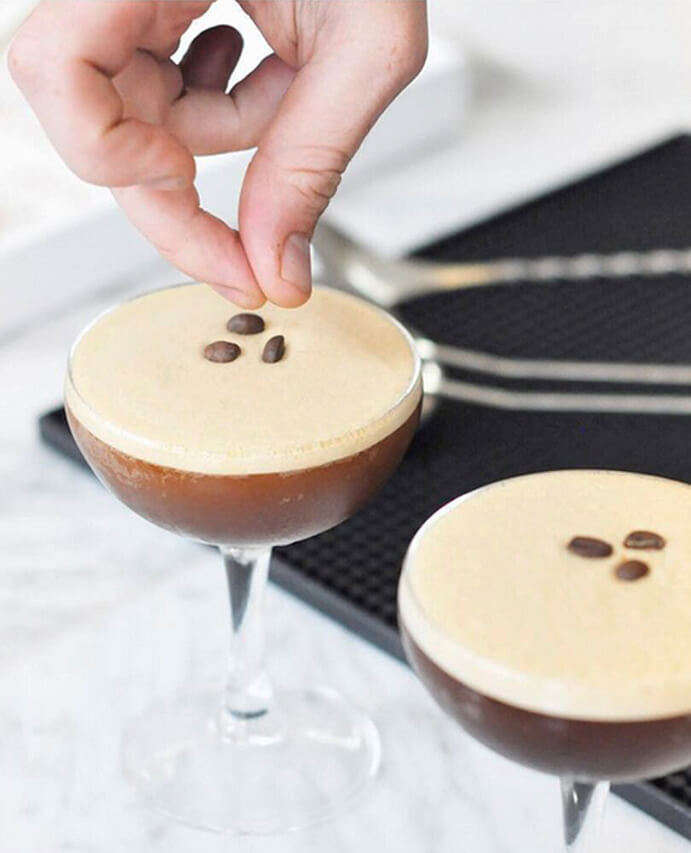
Sam’s perfect Espresso Martini
YOU WILL NEED:
40ml vodka
35ml Grind House Blend Espresso
20ml sugar syrup (equal parts hot water and sugar, stir to dissolve)
THE HOW-TO:
1. Add all the ingredients to a cocktail shaker and fill 3/4 full with ice.
2. Shake vigorously, ensuring the ice is hitting either end of the shaker for 8–10 seconds.
3. Double strain into a coupe glass.
4. Garnish with 3 coffee beans.
5. Enjoy!


